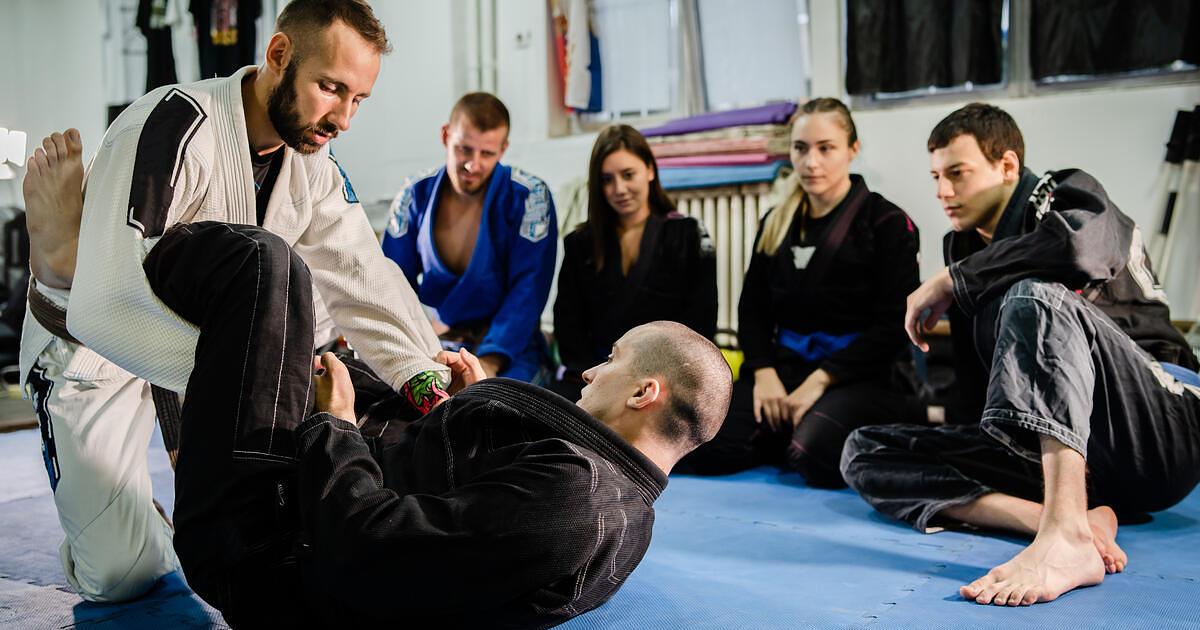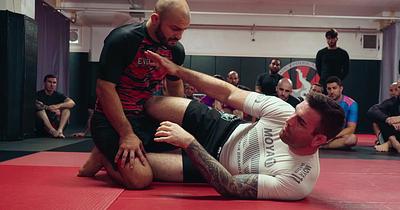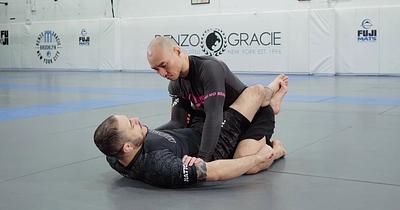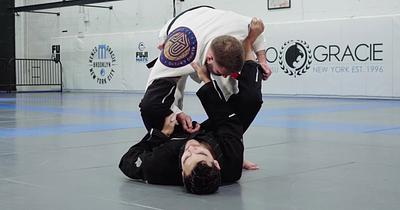7 Reasons Why Brazilian Jiu-Jitsu is So Effective
by Team Digitsu
Updated: April 03, 2024

Brazilian Jiu-Jitsu, or BJJ, is considered an effective martial art and combat sport for several reasons. BJJ focuses on grappling and ground fighting, which is highly relevant in real-life self-defense situations. The concept of leverage allows smaller, weaker practitioners to defend themselves against larger, stronger opponents. BJJ emphasizes proper technique over brute strength, which means anyone can learn to be effective in BJJ. Additionally, BJJ training and sparring help practitioners develop the skills and muscle memory necessary to use leverage effectively in a real-life situation. BJJ also promotes a healthy, active lifestyle and has a strong community and support network.
1. BJJ focuses on grappling and ground fighting, which are highly relevant in real-life self-defense situations.
BJJ is a martial art and combat sport focusing on grappling and ground fighting. Grappling refers to close-range combat, where the goal is to control an opponent's movements and either throw them to the ground or take them down to the ground. Ground fighting refers to combat on the ground, where the goal is to control an opponent's movements and either apply a submission hold or gain a superior position.
In a real-life self-defense situation, a fight will likely end up on the ground. This is because most attackers are not trained in grappling or ground fighting and will not be prepared for this situation. By focusing on grappling and ground fighting, BJJ gives practitioners the skills and knowledge to dominate an opponent in this situation.
Additionally, grappling and ground fighting techniques are often more effective than strikes in a self-defense situation. This is because strikes can easily miss or be blocked, and they can also cause serious injury to the attacker. Grappling and ground fighting techniques, on the other hand, allow for more control and precision, which can help to neutralize an attacker without causing unnecessary harm.
Overall, the focus on grappling and ground fighting makes BJJ an effective martial art and combat sport for real-life self-defense situations.
2. In BJJ, leverage allows smaller, weaker practitioners to defend themselves against larger, stronger opponents.
One of the key principles of Brazilian Jiu-Jitsu, or BJJ, is the concept of leverage. Leverage uses mechanical advantage to control an opponent's movements and neutralize their strength. In BJJ, leverage is achieved by using proper body position and technique to apply pressure to an opponent's joints, muscles, and other weak points.
This principle of leverage is especially important for smaller, weaker practitioners who may need to defend themselves against larger, stronger opponents. In a self-defense situation, a smaller person may not have the strength to overpower a larger opponent, but they can use proper technique and leverage to control the situation.
For example, suppose a larger opponent tries to grab a smaller practitioner. In that case, the smaller practitioner can use their body position and technique to break the grip and take the opponent to the ground. Once on the ground, the smaller practitioner can use leverage to control the opponent's movements and prevent them from using their full strength.
Additionally, leverage can be used to set up submission holds, which can end a fight quickly and decisively. For example, if a smaller practitioner can trap an opponent's arm and apply pressure to the elbow, they can force the opponent to tap out or risk serious injury.
Overall, the concept of leverage is one of the key reasons why BJJ is considered to be an effective martial art for smaller, weaker practitioners. Using proper technique and body position, a smaller practitioner can control a larger opponent and defend themselves effectively.
3. BJJ emphasizes proper technique over brute strength, which means anyone can learn to be effective in BJJ.
Another factor that makes BJJ an effective martial art and combat sport is its emphasis on proper technique over brute strength. In BJJ, practitioners are taught to use technique, strategy, and leverage to control an opponent rather than relying on raw strength or athleticism.
This emphasis on technique means that anyone can learn to be effective in BJJ, regardless of size, strength, or athletic ability. By focusing on proper technique and strategy, even a smaller, weaker practitioner can defend themselves against a larger, stronger opponent.
Additionally, the focus on technique in BJJ means that practitioners can continue to improve and refine their skills throughout their training and careers. Unlike other martial arts or combat sports, where peak physical ability is necessary for success, BJJ allows practitioners to continue to grow and evolve as they learn new techniques and strategies.
Overall, the emphasis on proper technique in BJJ means that anyone can learn to be effective in this martial art, regardless of their size, strength, or athletic ability. By focusing on technique and strategy, BJJ practitioners can continue to improve and evolve throughout their training and careers
4. BJJ training and sparring helps practitioners develop the skills and muscle memory necessary to use leverage effectively in a real-life situation
To use the principles of leverage effectively in a real-life self-defense situation, BJJ practitioners need to develop the necessary skills and muscle memory. This is where training and sparring come in.
Through regular training and sparring, BJJ practitioners can develop the physical and mental skills necessary to use leverage effectively in a real-life situation. Training drills and sparring sessions allow practitioners to practice techniques and movements under controlled conditions, which helps to develop the muscle memory and reflexes necessary to use these techniques instinctively in a real-life situation.
Additionally, training and sparring help to develop the mental skills necessary to use leverage effectively in a real-life situation. Through training and sparring, practitioners can learn to think quickly and strategically, and to anticipate an opponent's movements. This mental awareness and quick thinking can be crucial in a self-defense situation, where split-second decisions can make the difference between success and failure.
Overall, BJJ training and sparring are essential in helping practitioners develop the skills and muscle memory necessary to use leverage effectively in a real-life situation. By drilling techniques and sparring with other practitioners, BJJ practitioners can gain the confidence and knowledge necessary to use leverage in a real-life situation.
5. BJJ has a strong emphasis on safety, which means that practitioners can train and spar with minimal risk of injury.
One of the key factors that make BJJ an effective martial art and combat sport is its strong emphasis on safety. BJJ practitioners are taught to train and spar in a controlled, safe environment where the risk of injury is minimized.
In BJJ training and sparring sessions, practitioners are taught to tap out or signal surrender when they are in a vulnerable position or experiencing discomfort. This allows the practitioner to signal that they are in a potentially dangerous position, and their opponent can immediately release the hold or stop the attack.
Additionally, BJJ practitioners are taught to avoid using techniques that could cause serious injuries, such as strikes to the head or neck. This means that practitioners can train and spar with minimal risk of injury and can focus on developing their skills and techniques without worrying about getting hurt.
Overall, the strong emphasis on safety in BJJ means that practitioners can train and spar with minimal risk of injury. This allows them to focus on developing their skills and techniques without worrying about getting hurt, which is essential in making BJJ an effective martial art and combat sport.
6. BJJ promotes a healthy, active lifestyle and can improve overall physical fitness and mental well-being.
In addition to its effectiveness as a martial art and combat sport, BJJ promotes a healthy, active lifestyle. Regular BJJ training and sparring can improve overall physical fitness and mental well-being.
BJJ is a full-body workout that can improve strength, flexibility, and cardiovascular fitness. Regular BJJ training can help to increase muscle tone, improve coordination and balance, and increase cardiovascular endurance. These physical benefits can help to improve overall health and well-being.
Additionally, BJJ can have mental and emotional benefits. The discipline and focus required for BJJ training can help to improve concentration and focus and can reduce stress and anxiety. The sense of accomplishment and camaraderie that comes from training and sparring with other practitioners can also improve self-esteem and confidence.
Overall, BJJ promotes a healthy, active lifestyle and can improve overall physical fitness and mental well-being. By engaging in regular BJJ training, practitioners can experience a wide range of physical and mental benefits that can improve their overall health and well-being.
7. BJJ has a strong community and support network, which can provide a sense of belonging and camaraderie.
In addition to its physical and mental benefits, BJJ also has a strong community and support network. This can provide practitioners with a sense of belonging and camaraderie and can help to motivate and inspire them to continue training and improving.
BJJ practitioners often train and spar in groups, which can foster a sense of community and support among the members. Practitioners can provide encouragement and support to each other and can help each other to improve and succeed.
Additionally, BJJ has a strong network of coaches, trainers, and mentors who can provide guidance and support to practitioners. These experienced practitioners can offer advice and support and can help to motivate and inspire newer practitioners to continue training and improving.
Overall, the strong community and support network in BJJ can provide practitioners with a sense of belonging and camaraderie. This can help to motivate and inspire practitioners to continue training and improving and can provide a source of support and guidance throughout their BJJ journey.
Conclusion
In conclusion, Brazilian Jiu-Jitsu, or BJJ, is an effective martial art and combat sport for several reasons. BJJ focuses on grappling and ground fighting, which is highly relevant in real-life self-defense situations. The concept of leverage allows smaller, weaker practitioners to defend themselves against larger, stronger opponents. BJJ emphasizes proper technique over brute strength, which means anyone can learn to be effective in BJJ. Additionally, BJJ training and sparring help practitioners develop the skills and muscle memory necessary to use leverage effectively in a real-life situation. BJJ also promotes a healthy, active lifestyle and has a strong community and support network. These factors make BJJ an effective and beneficial martial art and combat sport for practitioners of all sizes and abilities.


